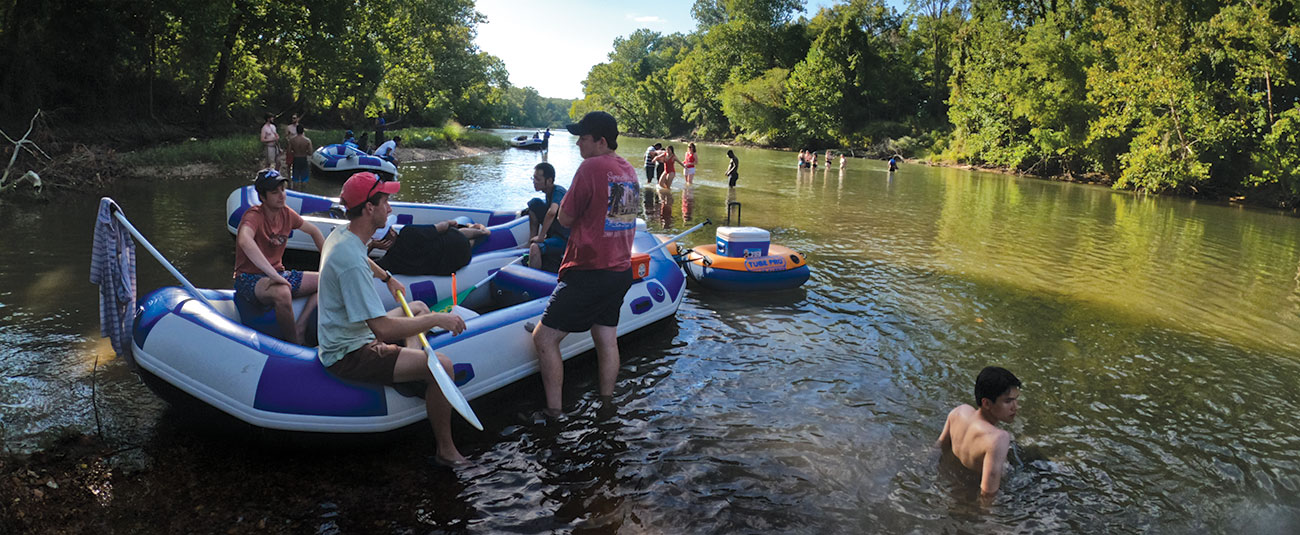Perseverance through the pandemic
Engineering student groups use their ingenuity to provide community during mostly virtual academic year
Students thrive on connections with each other, and student groups play a big role in that. What happens when all in-person activities are canceled for an entire academic year due to a global pandemic?
Several McKelvey School of Engineering student groups used their innate problem-solving skills and developed creative ways to keep their groups active after the March 2020 campus closure. And while most of the events were over Zoom or a similar platform, students were able to form new friendships and maintain existing ones, even when in different parts of the country and the world.
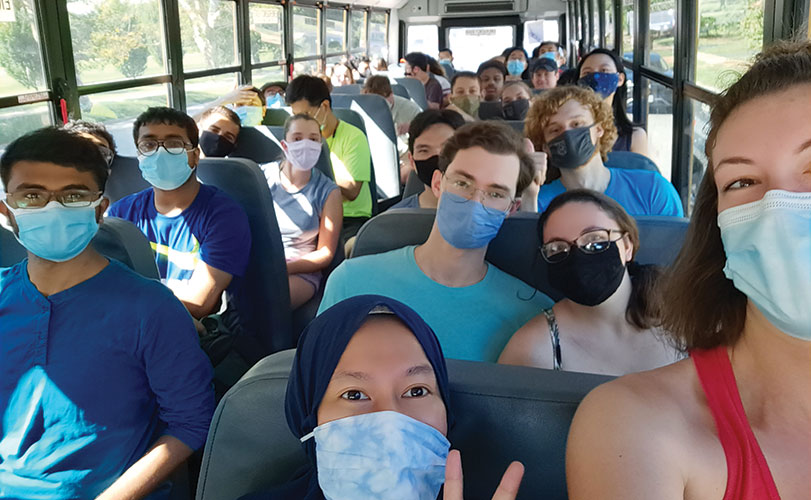
AGES (Association of Graduate Engineering Students) float trip in September 2021.
“Now that vaccination rates are increasing, we are beginning to promote our in-person events, starting with the monthly happy hour, now held outdoors… We went on a float trip on a Saturday in September and had a lot of people participate. Everyone is happy to be able to be together and spend time together off campus.”
— Rachel Blow, AGES coordinator and a dual degree master’s student in chemical engineering
oSTEM @ WashU, which supports the LGBTQ+ community in science, technology, engineering and math, faced an additional challenge: it launched at WashU in fall 2020. Despite few students being on campus, an inaugural group of nine students, from both McKelvey Engineering and Arts & Sciences, gathered to form the organization, write meeting and event plans, and train new members. Its first general board meeting attracted more than 40 students. By the end of the academic year, the group had nearly 100 members and was quickly growing its social media following.
“The fact that we had so many people speaks to the reality that queer reality in STEM is so poor, and there is so much desire to change that,” said David Massey, external president of oSTEM. “The prospect of being able to have that kind of impact energized a lot of people.”
“We wanted to have a fun and interactive experience, and Zoom really helped empower us to do that because not all of these people were in St. Louis.”
— David Massey, Senior majoring in geology in Arts & Sciences
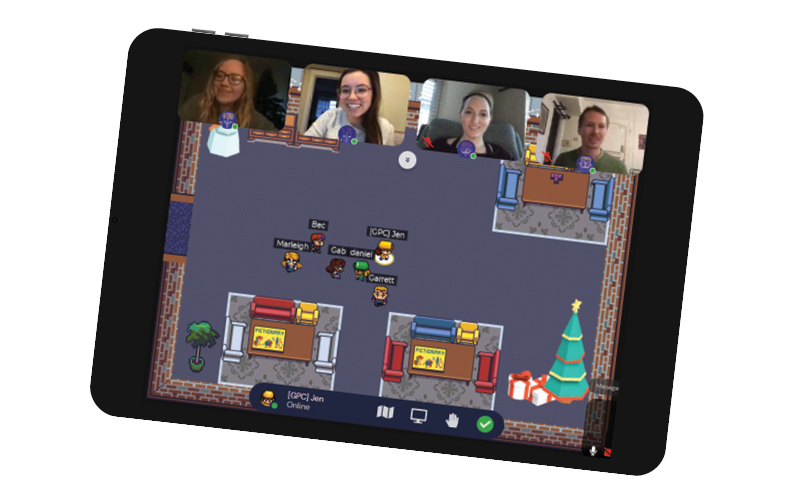
AGES 2020 Holiday party held virtually on Gather.
The Association of Graduate Engineering Students (AGES) offers both professional and social activities for graduate students in McKelvey Engineering. While AGES transitioned its general board meetings and a few other events to Zoom, the executive board wanted to maintain a sense of community in this newly transitioned virtual and social-distanced world. In one of the efforts to directly engage graduate students, the group had a running challenge that asked participants to log miles run over a month using the Nike Run Club app.
In addition, the group had various social media challenges that required using different hashtags corresponding to different themes each month. They then held a prize drawing for anyone who posted and tagged AGES. By the time the winter holidays approached, group members were experiencing Zoom fatigue, so AGES moved to the Gather.town platform, which creates a virtual campus that allows students to more realistically recreate the interactions they had when on campus. They used Gather.town to host their virtual holiday party, which they shared with the Graduate Professional Council and Graduate Student Senate. Participants each had an avatar with which they could play games, have an ugly sweater contest and celebrate together without actually being in the same physical place.
For their coordination of the holiday party event, AGES won a Liberman Leadership Award for Interdisciplinary Collaboration from the Liberman Graduate Center.
“It was a way to be boost friendly competition, promote active physical and social lifestyles, and best of all, you could participate from anywhere in the world . . . It went so well that we extended it to cycling the next month.”
— Melissa McCann, Communications officer for AGES and a doctoral student in mechanical engineering & materials science
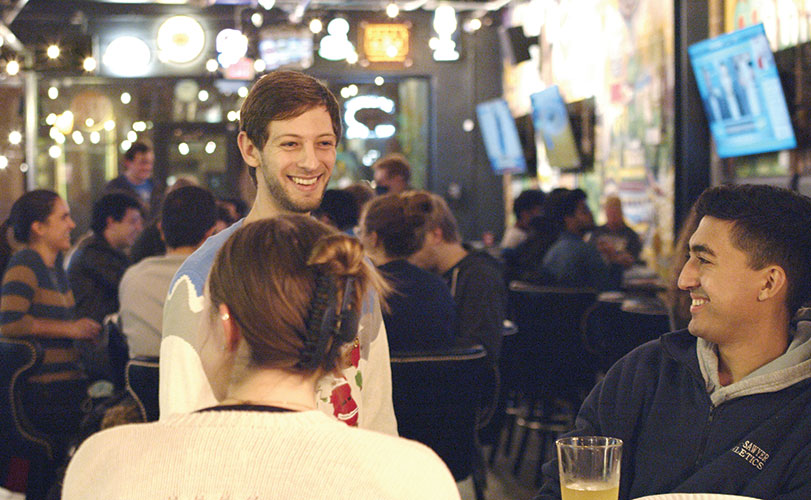
AGES students marked the end of the fall 2021 semester with a happy hour at a nearby bar. All students were vaccinated and were following recommended guidelines at that time. Photo by Taylor Bevirt
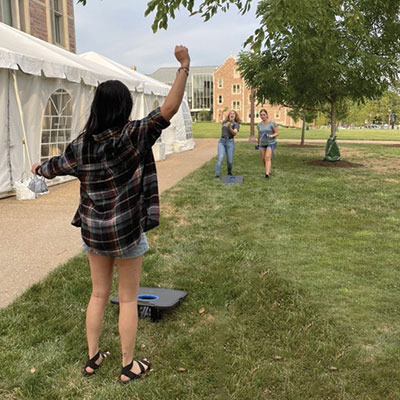
The Society for Women Engineers (SWE) offers social, networking and professional events for women engineering students. The group transitioned its professional events to Zoom calls and had a good turnout, said Caitlind Walker, who is president of SWE.
“While it was good for professional development and corporate relations, what was more important to us was having that connection and a community of women engineers that students knew they could go to,” Walker said.
Walker and the executive board created a social event for group members every two weeks throughout the 2020-21 academic year. Events included online escape rooms and a cookie decorating event with prizes.
“A few SWE members knew each other from a class they had together, but being in the virtual SWE events allowed them to become friends. That makes me happy to see that SWE helped them form that bond.” Walker said.
In addition, some of the first-year students had the opportunity to participate in the virtual national leadership conference, which includes networking opportunities, career skills, resume reviews, and a career and internship fair.
“There were a lot of first-year students involved, and they told me they have felt more of a sense of community at WashU in general because of these events.”
— Caitlind Walker, President of SWE
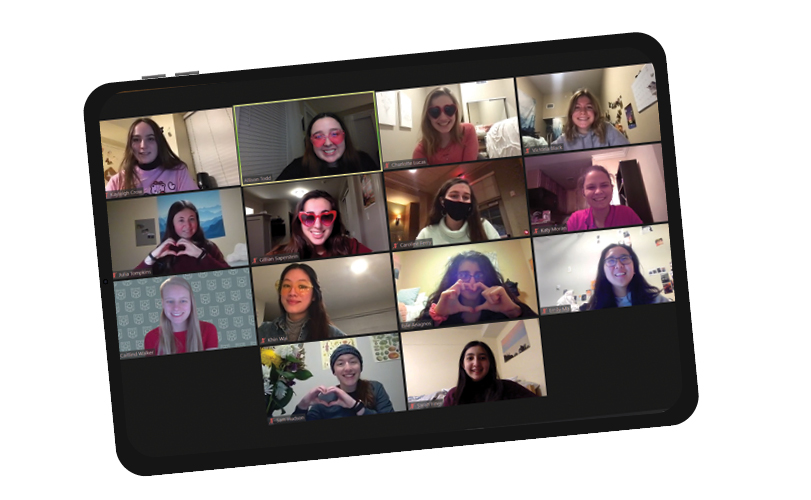
The Society of Women Engineers held a virtual cookie decorating event. They provided kits for each participant, then decorated them together via Zoom. SWE also held a virtual Halloween costume contest and a virtual escape room event.
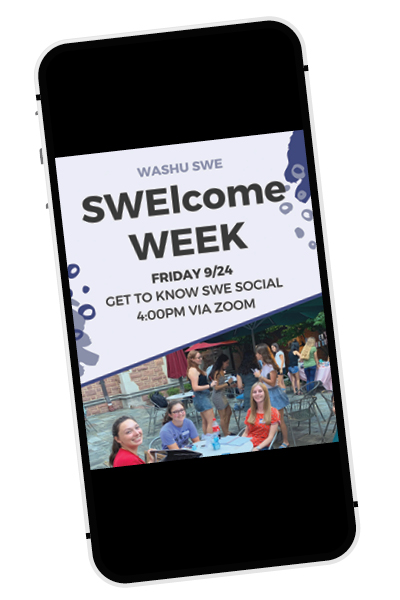
The 24-member WU Rocketry team was able to design, manufacture and build a rocket that could reach a height of 1 mile and release a payload during landing, all during the 2020-21 academic year. Since campus buildings were mostly closed, Caitlind Walker, founder of the group and a senior majoring in electrical engineering, hand-delivered parts of the rocket to members of the team who were in St. Louis. Each team member or small group of members would build one component, then Walker would pick up the components and add them to the rocket. Since they had limited access to the Spartan Light Metal Products Makerspace, they had to use external manufacturers to fabricate parts for their rocket. The team’s participation in the annual NASA Student Launch was possible with support from the McDonnell Center for Space Sciences.
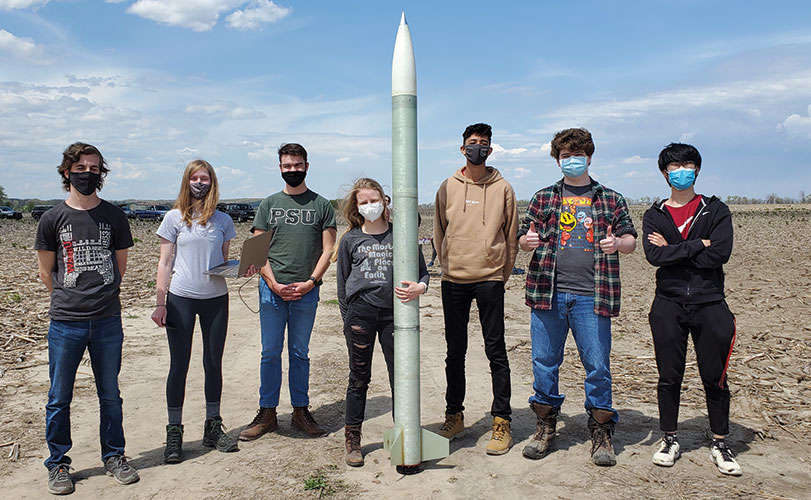
EnCouncil followed a similar model by offering an event every two weeks. Instead of the traditional gathering that offers cookies and milk after physics exams, students could register to pick up their cookies earlier in the day, then gather on Zoom to eat their cookies together virtually and relax after the exam.
To get more people involved, EnCouncil often partnered with other student groups, such as SWE and Alpha Omega Epsilon (AEO), a social and professional sorority for women in STEM. Walker said EnCouncil asked members and participants for feedback throughout the year to improve events as the year went on.
“Those who attended the events really liked them and said they got to know other people in more of a social setting than an academic setting,” she said.
Many other student groups, including the National Society of Black Engineers, held virtual events and meetings throughout the year.
Back to Engineering Momentum
